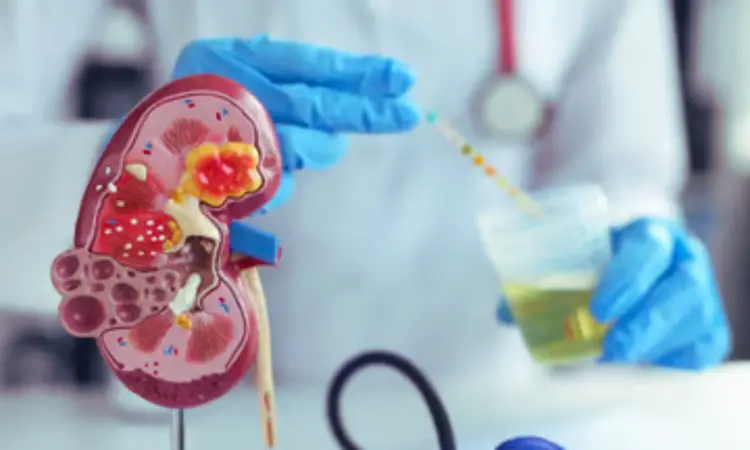- Home
- Medical news & Guidelines
- Anesthesiology
- Cardiology and CTVS
- Critical Care
- Dentistry
- Dermatology
- Diabetes and Endocrinology
- ENT
- Gastroenterology
- Medicine
- Nephrology
- Neurology
- Obstretics-Gynaecology
- Oncology
- Ophthalmology
- Orthopaedics
- Pediatrics-Neonatology
- Psychiatry
- Pulmonology
- Radiology
- Surgery
- Urology
- Laboratory Medicine
- Diet
- Nursing
- Paramedical
- Physiotherapy
- Health news
- Fact Check
- Bone Health Fact Check
- Brain Health Fact Check
- Cancer Related Fact Check
- Child Care Fact Check
- Dental and oral health fact check
- Diabetes and metabolic health fact check
- Diet and Nutrition Fact Check
- Eye and ENT Care Fact Check
- Fitness fact check
- Gut health fact check
- Heart health fact check
- Kidney health fact check
- Medical education fact check
- Men's health fact check
- Respiratory fact check
- Skin and hair care fact check
- Vaccine and Immunization fact check
- Women's health fact check
- AYUSH
- State News
- Andaman and Nicobar Islands
- Andhra Pradesh
- Arunachal Pradesh
- Assam
- Bihar
- Chandigarh
- Chattisgarh
- Dadra and Nagar Haveli
- Daman and Diu
- Delhi
- Goa
- Gujarat
- Haryana
- Himachal Pradesh
- Jammu & Kashmir
- Jharkhand
- Karnataka
- Kerala
- Ladakh
- Lakshadweep
- Madhya Pradesh
- Maharashtra
- Manipur
- Meghalaya
- Mizoram
- Nagaland
- Odisha
- Puducherry
- Punjab
- Rajasthan
- Sikkim
- Tamil Nadu
- Telangana
- Tripura
- Uttar Pradesh
- Uttrakhand
- West Bengal
- Medical Education
- Industry
Kidney parenchyma fat content similar between healthy controls and diabetes patients regardless of CKD status: Study

Denmark: A recent study published in the Journal of Diabetes and its Complications has explored the role of kidney fat content in individuals with type 2 diabetes (T2D) and chronic kidney disease (CKD), providing important insights into how fat accumulation may influence kidney health in these populations.
The results revealed that kidney parenchyma fat content was similar between individuals with T2D and healthy controls, regardless of CKD status. However, kidney sinus fat volume was notably higher in individuals with T2D and even higher still in those with T2D and CKD. The study suggests that while overall kidney parenchyma fat content does not significantly differ between individuals with T2D and healthy individuals, fat accumulation in the kidney sinus is more pronounced in those with diabetes, and even more so in those with concurrent CKD.
The researchers note that kidneys may be particularly vulnerable to ectopic fat and its lipotoxic effects, which could predispose them to chronic kidney disease in individuals with type 2 diabetes. To explore this further, Niels Sondergaard Heinrich, Steno Diabetes Center Copenhagen, Herlev, Denmark, and colleagues investigated whether kidney parenchyma fat content and kidney sinus fat volume are elevated in persons with T2D and CKD.
For this purpose, the researchers conducted a cross-sectional study involving 29 controls, 27 individuals with type 2 diabetes (T2D) but no chronic kidney disease, and 48 individuals with T2D and early CKD (defined by a urine albumin-creatinine ratio (UACR) ≥ 30 mg/g). Kidney parenchyma fat content was measured using magnetic resonance spectroscopy, while kidney sinus fat volume was assessed using Dixon scans.
The investigation uncovered the following findings:
- In the control, T2D without CKD, and T2D with CKD groups, median UACR values were 5, 6, and 95 mg/g, respectively.
- The mean estimated glomerular filtration rate (eGFR) was 89 ± 11, 94 ± 11, and 77 ± 22 ml/min/1.73m² in the control, T2D without CKD, and T2D with CKD groups, respectively.
- Kidney parenchyma fat content was 1.0, 0.7, and 1.0 % in the control, T2D without CKD, and T2D with CKD groups, respectively.
- Kidney sinus fat volume was 2.8, 8.0, and 10.3 ml in the control, T2D without CKD, and T2D with CKD groups, respectively.
- Approximately 90% of T2D participants were prescribed a sodium-glucose cotransporter-2 inhibitor or a glucagon-like peptide-1 receptor agonist.
In the context of modern, multifactorial management of type 2 diabetes, the study found that kidney parenchyma fat content, measured using magnetic resonance spectroscopy, was comparable between healthy controls and individuals with T2D, regardless of chronic kidney disease status. However, kidney sinus fat volume was significantly higher in individuals with T2D, and even more pronounced in those with concurrent CKD.
Reference:
Heinrich, N. S., Pedersen, R. P., Vestergaard, M. B., Lindberg, U., Andersen, U. B., Haddock, B., Fornoni, A., Larsson, H. B. W., Rossing, P., & Hansen, T. W. (2025). Kidney fat by magnetic resonance spectroscopy in type 2 diabetes with chronic kidney disease. Journal of Diabetes and its Complications, 39(2), 108923. https://doi.org/10.1016/j.jdiacomp.2024.108923
Dr Kamal Kant Kohli-MBBS, DTCD- a chest specialist with more than 30 years of practice and a flair for writing clinical articles, Dr Kamal Kant Kohli joined Medical Dialogues as a Chief Editor of Medical News. Besides writing articles, as an editor, he proofreads and verifies all the medical content published on Medical Dialogues including those coming from journals, studies,medical conferences,guidelines etc. Email: drkohli@medicaldialogues.in. Contact no. 011-43720751


